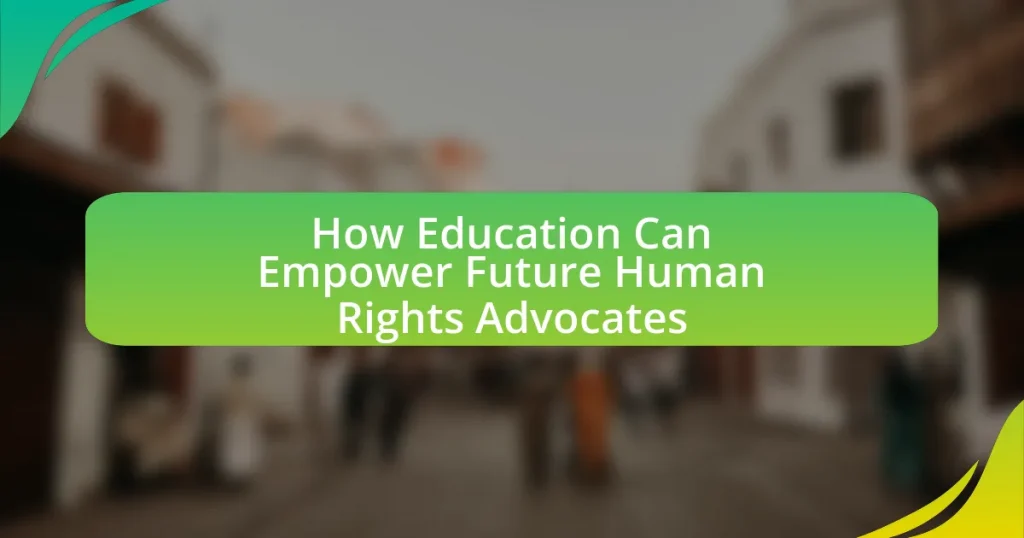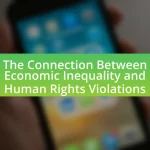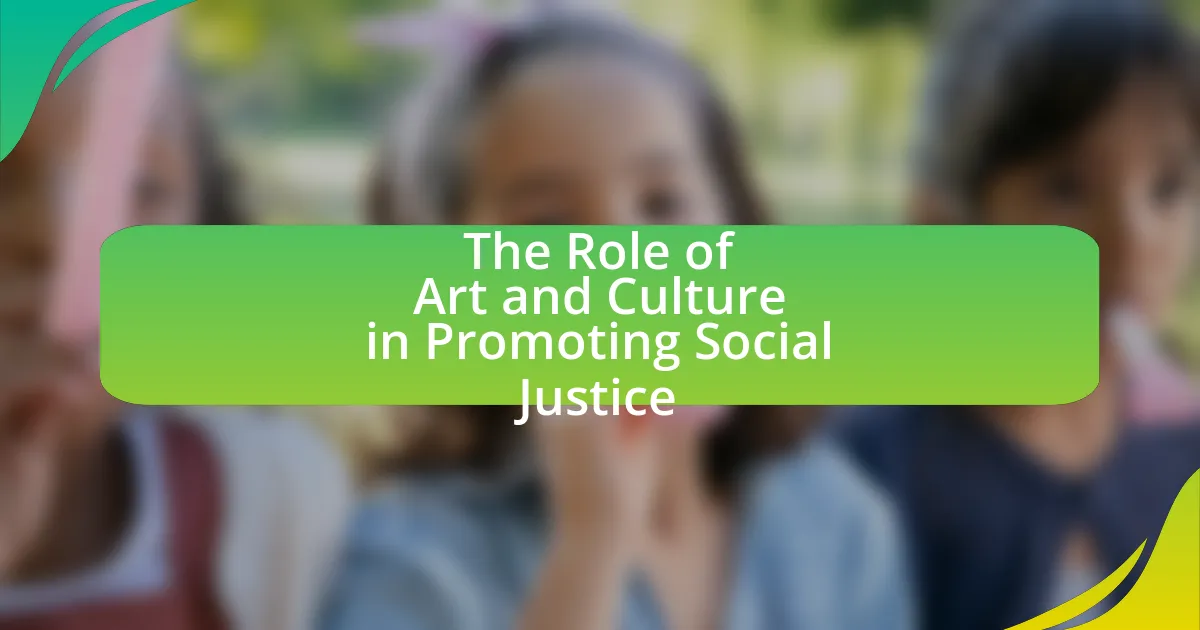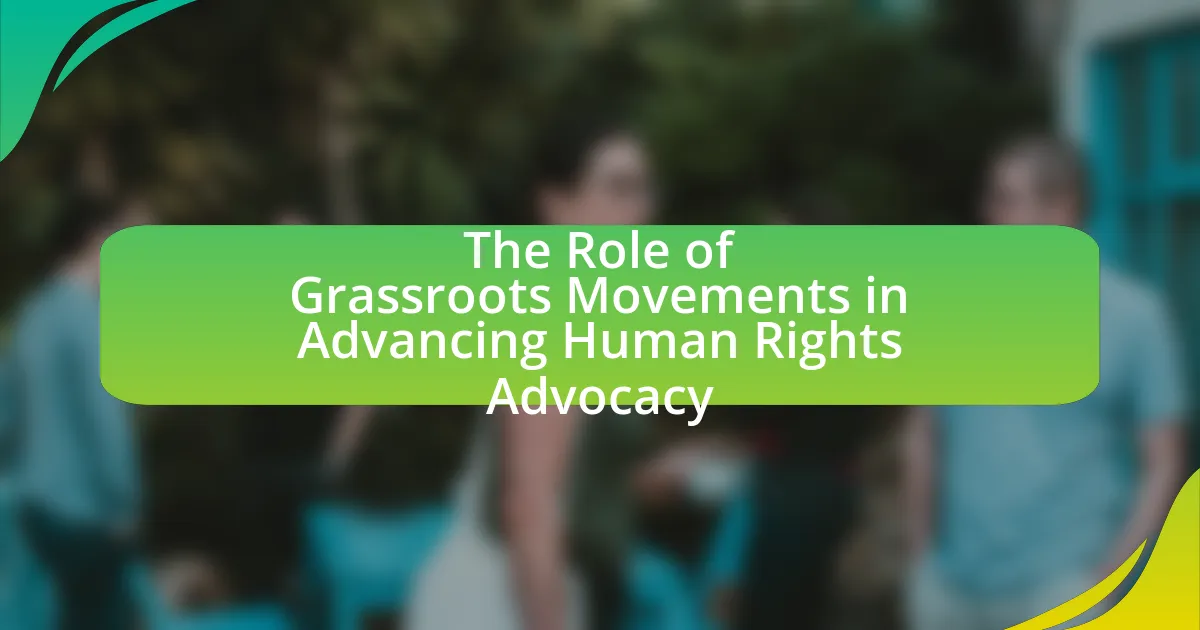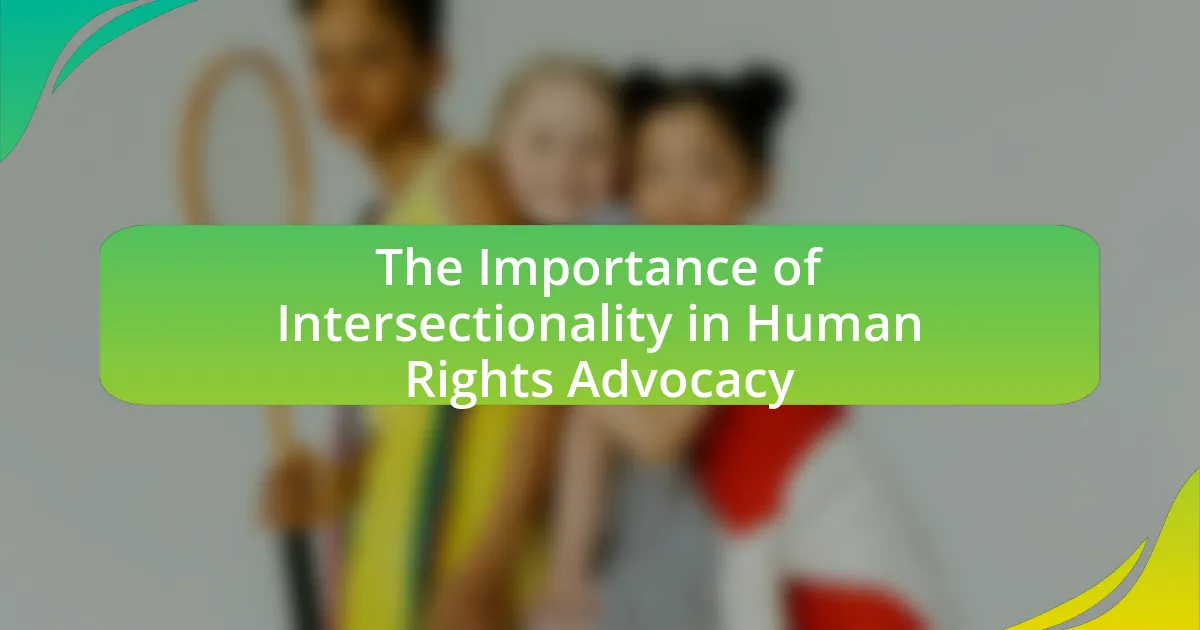Education plays a pivotal role in empowering future human rights advocates by providing them with essential knowledge, skills, and values to address human rights issues effectively. Comprehensive curricula that encompass human rights law, social justice, and ethical reasoning enable students to analyze complex situations and advocate for marginalized communities. Research indicates that educational programs focused on human rights foster awareness, critical thinking, and civic engagement, ultimately preparing individuals to challenge injustices and promote equality. Additionally, various educational pathways, including degree programs, workshops, and internships, enhance advocacy skills and deepen understanding of human rights, equipping aspiring advocates to make a tangible impact in their communities and beyond.
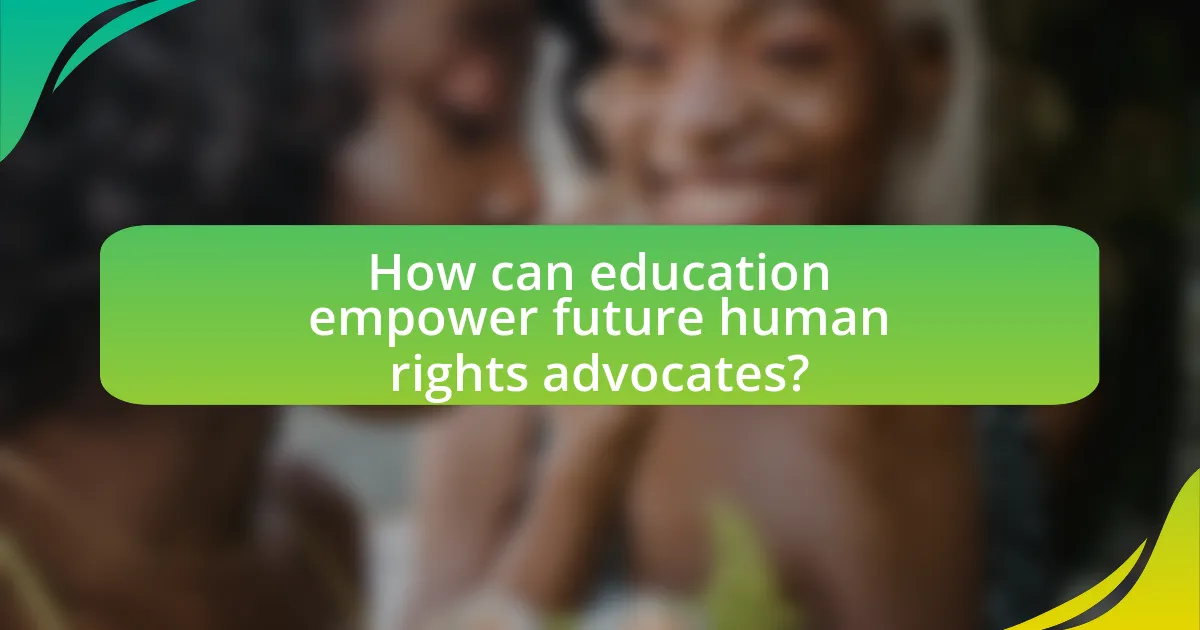
How can education empower future human rights advocates?
Education empowers future human rights advocates by equipping them with critical knowledge, skills, and values necessary to understand and address human rights issues. Through comprehensive curricula that include human rights law, social justice, and ethical reasoning, students develop the ability to analyze complex situations and advocate effectively for marginalized communities. Research indicates that educational programs focused on human rights increase awareness and engagement; for instance, a study by the United Nations Educational, Scientific and Cultural Organization (UNESCO) found that education fosters a culture of respect for human rights and encourages active citizenship among students. This foundational knowledge and engagement prepare individuals to challenge injustices and promote equality in their communities and beyond.
What role does education play in shaping human rights advocates?
Education plays a crucial role in shaping human rights advocates by providing them with the knowledge, skills, and critical thinking necessary to understand and address human rights issues. Through formal education, individuals learn about the historical context of human rights, legal frameworks, and the mechanisms for advocacy and activism. For instance, studies show that individuals with higher education levels are more likely to engage in civic activities and advocate for social justice, as they possess a deeper understanding of societal structures and inequalities. Furthermore, educational programs that focus on human rights often include practical experiences, such as internships and community service, which enhance advocacy skills and foster a commitment to social change.
How does formal education contribute to understanding human rights?
Formal education significantly enhances understanding of human rights by providing structured knowledge about legal frameworks, historical contexts, and ethical principles. Through curricula that include subjects like social studies, law, and ethics, students learn about the Universal Declaration of Human Rights and various international treaties, which establish the foundation for human rights advocacy. Research indicates that educational programs focused on human rights increase awareness and promote critical thinking, enabling students to analyze and challenge injustices. For instance, a study by the United Nations Educational, Scientific and Cultural Organization (UNESCO) found that education fosters a culture of respect for human rights, leading to greater civic engagement and advocacy among students.
What skills can be developed through educational programs for advocates?
Educational programs for advocates can develop critical skills such as effective communication, legal knowledge, negotiation, and advocacy strategies. These programs often include training in public speaking and persuasive writing, which enhance the ability to articulate issues clearly and influence decision-makers. Additionally, participants gain an understanding of human rights laws and policies, equipping them with the legal framework necessary for advocacy. Negotiation skills are honed through practical exercises, enabling advocates to navigate complex discussions and reach agreements. Furthermore, educational programs often emphasize strategic planning and grassroots mobilization, preparing advocates to organize campaigns and engage communities effectively.
Why is it important for future advocates to receive education on human rights?
Education on human rights is crucial for future advocates because it equips them with the knowledge and skills necessary to effectively promote and protect individual freedoms and dignity. Understanding human rights principles enables advocates to identify violations, engage in informed dialogue, and mobilize communities for action. For instance, the Universal Declaration of Human Rights, adopted by the United Nations in 1948, serves as a foundational document that outlines fundamental rights and freedoms, providing a framework for advocates to reference in their work. Furthermore, studies show that educated advocates are more successful in influencing policy changes and raising awareness, as they can articulate issues clearly and persuasively, thereby fostering a culture of respect for human rights.
How does education raise awareness about human rights issues?
Education raises awareness about human rights issues by providing individuals with knowledge about their rights and the rights of others, fostering critical thinking, and encouraging civic engagement. Through curricula that include human rights education, students learn about historical injustices, legal frameworks, and the importance of advocacy. For instance, UNESCO emphasizes that education can promote understanding of human rights principles, which is essential for developing informed citizens who can challenge violations. Furthermore, studies show that students exposed to human rights education are more likely to participate in social justice initiatives, demonstrating the direct impact of education on awareness and activism in human rights.
What impact does education have on advocacy effectiveness?
Education significantly enhances advocacy effectiveness by equipping individuals with critical knowledge, skills, and strategies necessary for effective communication and mobilization. Educated advocates are better able to understand complex social issues, analyze data, and construct compelling arguments that resonate with diverse audiences. For instance, research by the National Council for Social Studies indicates that individuals with higher education levels are more likely to engage in civic activities and advocacy efforts, demonstrating a direct correlation between education and active participation in social change. This foundational knowledge allows advocates to navigate legal frameworks, policy environments, and community dynamics more effectively, ultimately leading to more impactful advocacy outcomes.
What types of educational programs are available for aspiring human rights advocates?
Aspiring human rights advocates can pursue various educational programs, including undergraduate and graduate degrees in human rights, international relations, law, social justice, and public policy. These programs often include specialized courses on human rights law, advocacy strategies, and global human rights issues. For instance, institutions like Columbia University and the University of Essex offer dedicated master’s programs in human rights that equip students with theoretical knowledge and practical skills. Additionally, certificate programs and online courses from organizations such as Amnesty International and Human Rights Watch provide targeted training in advocacy and activism. These educational pathways are designed to prepare individuals for careers in non-governmental organizations, governmental agencies, and international bodies focused on human rights.
What are the benefits of pursuing a degree in human rights?
Pursuing a degree in human rights provides individuals with a comprehensive understanding of global human rights issues and equips them with the skills necessary for advocacy. This degree fosters critical thinking, analytical skills, and a deep awareness of legal frameworks, which are essential for addressing human rights violations. According to the United Nations, education in human rights promotes social justice and empowers individuals to challenge injustices effectively. Furthermore, graduates often find diverse career opportunities in non-governmental organizations, international agencies, and governmental bodies, enhancing their ability to make a tangible impact in the field of human rights.
How do workshops and seminars enhance advocacy skills?
Workshops and seminars enhance advocacy skills by providing participants with practical training, networking opportunities, and exposure to expert knowledge. These educational settings allow individuals to engage in role-playing scenarios, develop persuasive communication techniques, and learn effective strategies for mobilizing support. Research indicates that experiential learning, such as that found in workshops, significantly improves retention of advocacy skills, as participants actively apply concepts in real-world contexts. Additionally, seminars often feature experienced advocates who share insights and best practices, further enriching the learning experience and equipping attendees with the tools necessary for effective advocacy.
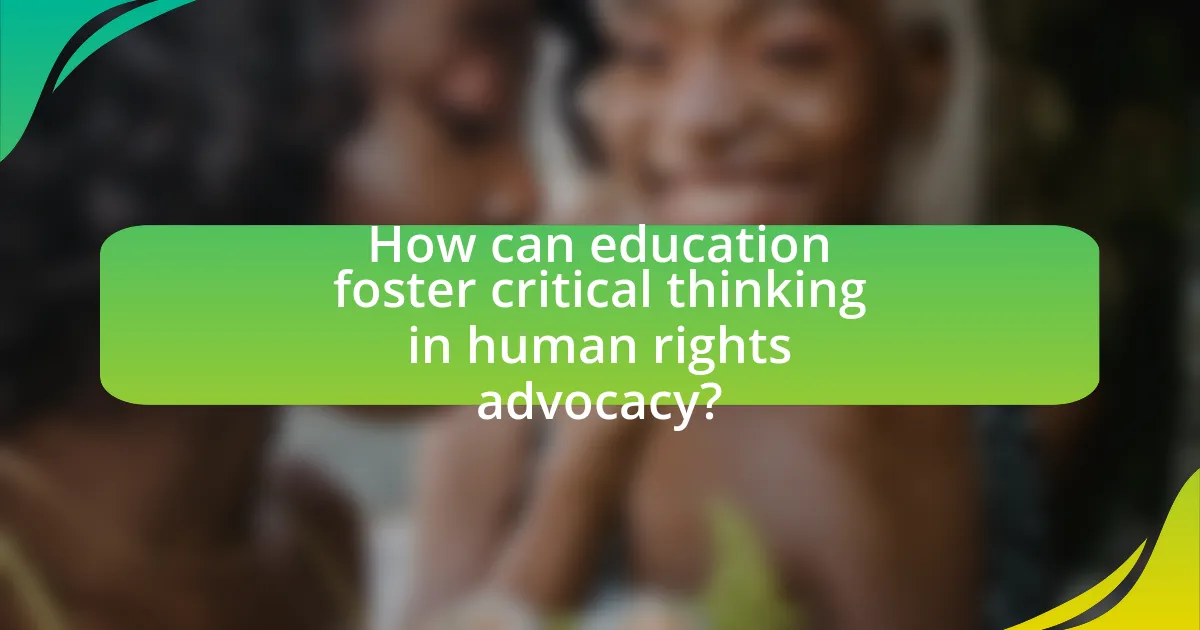
How can education foster critical thinking in human rights advocacy?
Education can foster critical thinking in human rights advocacy by integrating interdisciplinary curricula that challenge students to analyze complex social issues. This approach encourages learners to evaluate diverse perspectives, engage in debates, and apply ethical reasoning to real-world scenarios. For instance, programs that include case studies on historical human rights violations enable students to critically assess the effectiveness of various advocacy strategies. Research by the American Psychological Association indicates that critical thinking skills are enhanced through active learning techniques, such as group discussions and problem-solving exercises, which are essential in developing informed advocates capable of addressing human rights challenges effectively.
What is the significance of critical thinking in human rights work?
Critical thinking is significant in human rights work because it enables advocates to analyze complex issues, question assumptions, and evaluate evidence effectively. This analytical approach is essential for identifying human rights violations, understanding their root causes, and developing informed strategies for advocacy. For instance, critical thinking allows human rights defenders to assess the credibility of sources, differentiate between facts and opinions, and construct compelling arguments based on empirical data. By fostering a culture of critical inquiry, human rights education equips future advocates with the skills necessary to challenge injustices and promote accountability, ultimately leading to more effective interventions and policy changes.
How does critical thinking influence decision-making in advocacy?
Critical thinking significantly enhances decision-making in advocacy by enabling advocates to analyze complex issues, evaluate evidence, and consider multiple perspectives. This analytical approach allows advocates to identify the most effective strategies for addressing social injustices and human rights violations. For instance, a study published in the Journal of Human Rights Education highlights that advocates who employ critical thinking skills are more adept at formulating persuasive arguments and making informed choices that resonate with diverse audiences. By systematically questioning assumptions and assessing the implications of various actions, critical thinking fosters more effective and ethical advocacy outcomes.
What educational methods promote critical thinking among advocates?
Educational methods that promote critical thinking among advocates include problem-based learning, Socratic questioning, and experiential learning. Problem-based learning engages advocates in real-world scenarios, encouraging them to analyze complex issues and develop solutions, which enhances their critical thinking skills. Socratic questioning fosters dialogue and reflection, prompting advocates to examine their beliefs and assumptions critically. Experiential learning allows advocates to gain firsthand experience in advocacy work, facilitating deeper understanding and critical analysis of human rights issues. Research by Hmelo-Silver (2004) in “Problem-Based Learning: An Instructional Model and Its Constructivist Framework” supports the effectiveness of these methods in developing critical thinking skills.
How can experiential learning enhance understanding of human rights?
Experiential learning enhances understanding of human rights by providing individuals with direct engagement in real-world situations that illustrate human rights issues. This method allows learners to actively participate in activities such as simulations, role-playing, and community service, which foster empathy and critical thinking about human rights violations. Research indicates that experiential learning can lead to deeper retention of knowledge and a more profound emotional connection to the subject matter, as evidenced by studies showing that students who engage in experiential learning report higher levels of understanding and commitment to human rights advocacy. For instance, a study published in the Journal of Human Rights Education found that students who participated in experiential learning programs demonstrated increased awareness of human rights issues and a greater likelihood of becoming active advocates.
What role do internships and fieldwork play in education for advocates?
Internships and fieldwork are crucial in the education of advocates as they provide practical experience and exposure to real-world issues. These experiences allow advocates to apply theoretical knowledge in practical settings, enhancing their understanding of human rights challenges. For instance, a study by the National Association of Colleges and Employers found that 70% of employers prefer candidates with internship experience, highlighting the value of hands-on learning in developing essential skills. Additionally, fieldwork fosters networking opportunities, enabling advocates to connect with professionals in the field, which can lead to mentorship and job opportunities.
How can case studies be used to teach human rights effectively?
Case studies can be used to teach human rights effectively by providing real-world examples that illustrate the complexities and implications of human rights issues. These case studies engage students by allowing them to analyze specific situations, understand the context, and explore the consequences of human rights violations. For instance, the case study of the Rwandan Genocide highlights the failure of international intervention and the importance of accountability, enabling students to critically assess the role of global governance in protecting human rights. This method fosters critical thinking and empathy, as students can relate to the experiences of individuals affected by human rights abuses, thereby deepening their understanding and commitment to advocacy.
What challenges do educational institutions face in teaching human rights?
Educational institutions face several challenges in teaching human rights, including a lack of resources, insufficient training for educators, and varying levels of governmental support. Limited funding often restricts the availability of comprehensive curricula and materials necessary for effective human rights education. Additionally, many educators may not have received adequate training in human rights issues, which can hinder their ability to teach these topics effectively. Furthermore, in some regions, governmental policies may not prioritize human rights education, leading to inconsistencies in how these subjects are taught across different institutions. These challenges collectively impact the effectiveness of human rights education and the development of future advocates.
How can curriculum development address these challenges?
Curriculum development can address challenges in empowering future human rights advocates by integrating human rights education into existing programs. This approach ensures that students gain a comprehensive understanding of human rights principles, legal frameworks, and advocacy strategies. Research indicates that curricula incorporating experiential learning, such as simulations and community engagement, enhance students’ critical thinking and advocacy skills, which are essential for effective human rights work. For instance, the United Nations Educational, Scientific and Cultural Organization (UNESCO) emphasizes the importance of human rights education in fostering a culture of respect and understanding, thereby equipping students to confront social injustices.
What resources are available to support human rights education?
Resources available to support human rights education include educational materials, online courses, and organizations dedicated to human rights advocacy. For instance, the United Nations offers a range of resources through its Human Rights Office, including training manuals and educational toolkits that are designed to enhance understanding of human rights principles. Additionally, organizations like Amnesty International and Human Rights Watch provide online courses and workshops that focus on various aspects of human rights education. These resources are essential for empowering future advocates by equipping them with the knowledge and skills necessary to promote and protect human rights effectively.
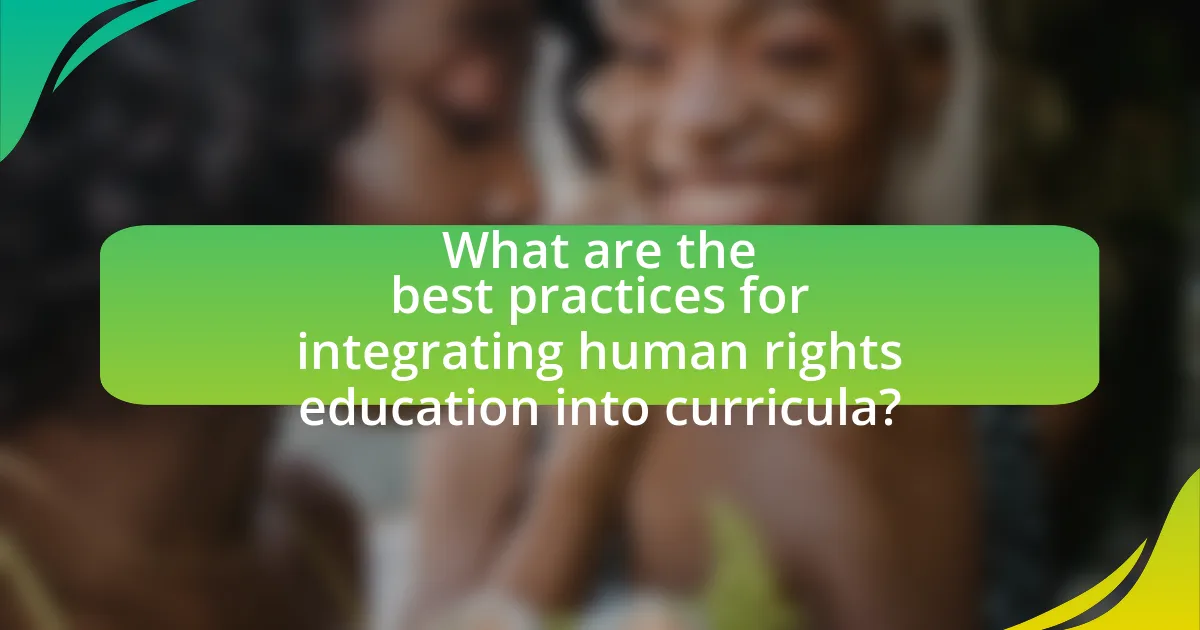
What are the best practices for integrating human rights education into curricula?
The best practices for integrating human rights education into curricula include adopting a multidisciplinary approach, fostering critical thinking, and promoting active participation. A multidisciplinary approach ensures that human rights concepts are woven into various subjects, such as history, social studies, and literature, allowing students to see the relevance of human rights in diverse contexts. Fostering critical thinking encourages students to analyze and question human rights issues, enhancing their understanding and engagement. Promoting active participation through projects, discussions, and community involvement empowers students to apply their knowledge in real-world situations. Research by the United Nations Educational, Scientific and Cultural Organization (UNESCO) highlights that effective human rights education leads to increased awareness and advocacy among students, demonstrating the importance of these practices in shaping future human rights advocates.
How can educators effectively teach human rights concepts?
Educators can effectively teach human rights concepts by integrating experiential learning, critical thinking, and interdisciplinary approaches into their curriculum. Experiential learning, such as simulations and role-playing, allows students to engage with human rights issues actively, fostering empathy and understanding. Critical thinking exercises encourage students to analyze and debate human rights topics, enhancing their ability to articulate and defend their views. Interdisciplinary approaches, which connect human rights to history, law, and social studies, provide a comprehensive understanding of the subject. Research indicates that students exposed to these methods demonstrate a deeper awareness of human rights issues and are more likely to become advocates for change. For instance, a study published in the Journal of Human Rights Education found that students who participated in interactive human rights programs showed a 30% increase in their knowledge and commitment to human rights advocacy.
What teaching strategies are most effective for engaging students?
Active learning strategies are the most effective for engaging students. These strategies, such as collaborative group work, problem-based learning, and interactive discussions, promote student participation and critical thinking. Research indicates that active learning can increase student retention of information by up to 50% compared to traditional lecture-based approaches (Freeman et al., 2014, “Active Learning Increases Student Performance in Science, Engineering, and Mathematics,” Proceedings of the National Academy of Sciences). Additionally, incorporating technology, such as interactive simulations and online discussions, further enhances engagement by catering to diverse learning styles and fostering a more inclusive classroom environment.
How can technology be utilized to enhance human rights education?
Technology can enhance human rights education by providing accessible platforms for learning and engagement. Online courses, webinars, and interactive e-learning modules allow individuals worldwide to access human rights education regardless of geographical barriers. For instance, organizations like Amnesty International and Human Rights Watch utilize digital tools to disseminate information and resources, reaching millions of learners. Additionally, social media platforms facilitate discussions and awareness campaigns, enabling real-time engagement with human rights issues. According to a 2021 report by the United Nations Educational, Scientific and Cultural Organization (UNESCO), digital learning tools have significantly increased participation in human rights education initiatives, demonstrating their effectiveness in fostering awareness and advocacy.
What role do partnerships play in promoting human rights education?
Partnerships play a crucial role in promoting human rights education by facilitating collaboration among various stakeholders, including governments, NGOs, educational institutions, and communities. These partnerships enhance resource sharing, expertise exchange, and the development of comprehensive curricula that address human rights issues effectively. For instance, the United Nations Educational, Scientific and Cultural Organization (UNESCO) has partnered with multiple organizations to implement programs that integrate human rights education into school systems worldwide, demonstrating the effectiveness of collaborative efforts in reaching broader audiences and fostering a culture of respect for human rights.
How can collaboration with NGOs enhance educational programs?
Collaboration with NGOs can enhance educational programs by providing resources, expertise, and real-world experience that enrich the learning environment. NGOs often have specialized knowledge in human rights issues, which can be integrated into curricula, allowing students to engage with current global challenges. For instance, partnerships with organizations like Amnesty International or Human Rights Watch can facilitate workshops, guest lectures, and field trips that expose students to advocacy work. Research indicates that students involved in experiential learning through NGO collaboration demonstrate improved critical thinking and problem-solving skills, as evidenced by a study published in the Journal of Educational Psychology, which found that hands-on experiences significantly boost student engagement and retention of knowledge.
What benefits do partnerships with international organizations provide?
Partnerships with international organizations provide access to resources, expertise, and networks that enhance educational initiatives for human rights advocacy. These collaborations enable educational institutions to leverage funding, training programs, and best practices from established organizations, thereby improving the quality and reach of their human rights education efforts. For instance, partnerships with entities like the United Nations or Amnesty International can facilitate workshops, provide curriculum materials, and offer mentorship opportunities, which are crucial for developing effective advocates. Such collaborations have been shown to increase the impact of educational programs, as evidenced by various successful initiatives that have emerged from these alliances, demonstrating their effectiveness in empowering future human rights advocates.
What practical steps can aspiring advocates take to further their education in human rights?
Aspiring advocates can further their education in human rights by enrolling in specialized degree programs, attending workshops, and participating in internships with human rights organizations. Degree programs, such as those offered by universities focusing on international relations or law, provide foundational knowledge and critical thinking skills essential for advocacy. Workshops often cover specific topics like refugee rights or gender equality, allowing advocates to gain practical skills and insights. Internships with organizations like Amnesty International or Human Rights Watch offer hands-on experience and networking opportunities, which are crucial for building a career in this field.
How can individuals seek out mentorship opportunities in the field?
Individuals can seek out mentorship opportunities in the field of human rights advocacy by actively engaging with professional networks and organizations dedicated to human rights. Joining associations such as Amnesty International or Human Rights Watch provides access to mentorship programs and networking events where experienced advocates share their knowledge. Additionally, attending conferences and workshops focused on human rights issues allows individuals to connect with potential mentors who are established in the field. Research indicates that mentorship significantly enhances career development, with a study by the American Psychological Association showing that mentees are more likely to advance in their careers when they have a mentor.
What resources are available for self-directed learning in human rights advocacy?
Online courses, books, and organizations provide valuable resources for self-directed learning in human rights advocacy. Platforms like Coursera and edX offer courses from universities on human rights topics, enabling learners to access expert knowledge. Key texts such as “The International Human Rights Movement: A History” by Aryeh Neier and “Human Rights: A Very Short Introduction” by Andrew Clapham serve as foundational literature. Additionally, organizations like Amnesty International and Human Rights Watch provide extensive online resources, including reports, toolkits, and webinars, which facilitate practical understanding and engagement in human rights issues. These resources collectively support individuals in developing their advocacy skills and knowledge effectively.
